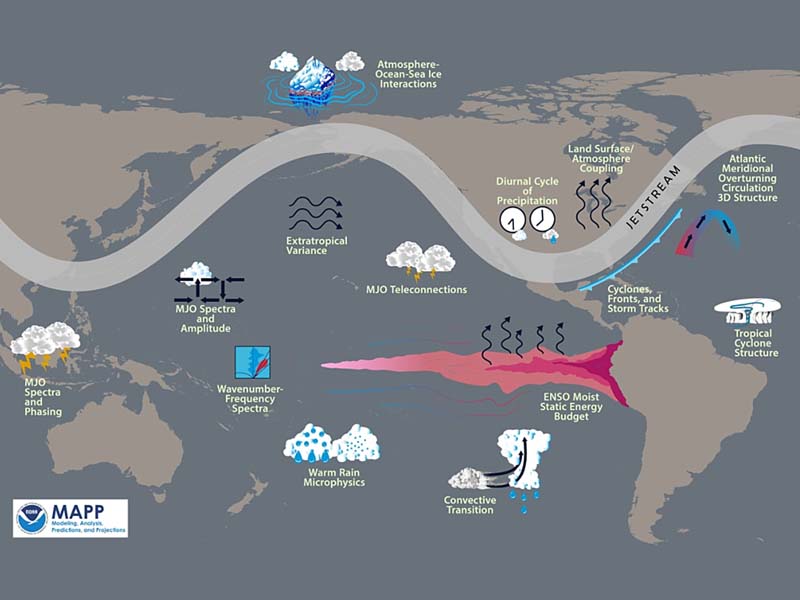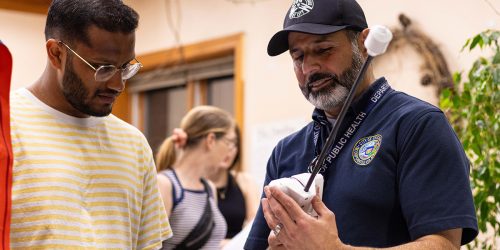CPO’s Modeling, Analysis, Predictions, and Projections (MAPP) program is announcing 6 new 3-year projects in Fiscal Year 2021 that aim to address key issues in the representation of Earth System processes to improve climate models. The competitively-selected projects total $4,671,2881, including $3,621,288 in grants and $1,050,000 in other awards.

Climate and Earth-system model development is a key component of NOAA’s mission to understand, forecast, and project changes in climate, weather, oceans, and coasts. These models provide a vast resource of information to NOAA scientists, decision makers, and other stakeholders, and also serve as an incubator to test and advance operational prediction efforts across all time scales.
To improve models, scientists need to better understand and benchmark deficiencies in simulating underlying climate processes that drive forecast errors.
Since FY 2015, the MAPP Program has been supporting community-based approaches to improve models by developing metrics to assess how climate processes are represented in models. These metrics are shared through an open-source framework that can be readily used by the community as a model evaluation tool to quicken the transition of research innovations into advances in life-saving forecasts and projections. This effort has been spearheaded by the MAPP Model Diagnostic Task Force (MDTF), led by NOAA’s Geophysical Fluid Dynamics Laboratory in partnership with the National Centers for Atmospheric Research and the Department of Energy.
A number of gaps remain in the current version of the Task Force’s software package for evaluating climate processes, such as in the areas of open- and coastal ocean systems, atmospheric chemistry, and land-surface processes. To address these gaps, MAPP is funding 6 new projects that will enhance this process-oriented framework approach and help scientists better understand the sources of bias in climate models.
A third iteration of the MDTF will be formed from the funded investigators and led by David Neelin (University of California, Los Angeles) and John Krasting (NOAA Geophysical Fluid Dynamics Laboratory), with support from their co-investigators Andrew Gettelman (National Center for Atmospheric Research), Eric Maloney (Colorado State University), and Paul Ullrich (University of California Davis). The Task Force will continue to develop, coordinate, and implement process-based model diagnostics packages, create collaboration between the funded investigators in the MDTF effort, and leverage the ongoing efforts toward advancing model evaluation and development capabilities.
The 6 new projects2 funded by the MAPP program in FY2021 are:
- Process-Oriented Diagnostics for the Western Boundary Current Variability and Midlatitude Air-Sea Interaction
This project aims to investigate the nature and impacts of the main biases of the Western Boundary Currents variability in the state-of-the-art climate models. This research will be based on a set of process-oriented model diagnostics, and will establish the dependence of these biases on model resolution and links to main large-scale circulation biases.- Lead PI: Young-Oh Kwon, Woods Hole Oceanographic Institution (WHOI) (Woods Hole, MA 02543)
- Co-PI: Claude Frankignoul, Woods Hole Oceanographic Institution (WHOI)
- Development of a Hydrologic Metrics Evaluation Package to Reduce and Understand Hydrologic Sensitivity Biases
This project will leverage observational products and a range of model simulations to develop and refine process-oriented diagnostics on the hydroclimate sensitivities, primarily runoff, of land surface models. A better understanding of Earth-system model sensitivity biases will increase the credibility and robustness of climate change impact assessments.- PI: Flavio Lehner, Cornell University (Ithaca, NY14850)
- Co-PIs: Andrew Wood, National Center for Atmospheric Research (NCAR) (Boulder, CO 80301); David Lawrance, National Center for Atmospheric Research (NCAR)
- Processed-Oriented Diagnostics of Aerosol-Cloud Interactions in CMIP6 Models
This project aims to quantify and better constrain the representation of aerosol- cloud processes in Coupled Model Intercomparison Project Phase 6 (CMIP6) models. These processes are a substantial source of uncertainty in predicting climate change. The model diagnosis will be compared with satellite measurements as observational constraints that account for the role of varying environmental factors in affecting the strength of aerosol-cloud interactions.- PI: Brain Soden, University of Miami (Miami, FL 33149)
- Process-Oriented Analysis of Organized Convection and Synoptic Disturbances in the Tropics
This project aims to address the questions of how synoptic-scale convective organization affects the probability of synoptic disturbances developing into tropical cyclones, and whether climate models correctly represent the effect of convective organization. It will develop and apply a set of diagnostics to evaluate climate model simulation of synoptic-scale tropical disturbance, the organization of tropical convection within them, and associated interactions among convection, moisture and radiation.- Lead PI: Allison Wing, Florida State University (Tallahassee, FL 32306)
- PIs: Daehyun Kim, University of Washington (Seattle, WA 98195); Suzana Camargo, Columbia University (Palisades, NY 10964)
- Atmospheric and Oceanic BL Processes Over the Eastern Equatorial Pacific: Development of Process-Oriented Diagnostics to Identify Errors in Climate Models with Implications to ENSO Teleconnections Over
This project will develop a comprehensive process-based diagnosis of systematic changes in vertical atmospheric structure in response to changes in ocean-atmosphere surface characteristics. The diagnosis will determine the eastern equatorial Pacific cause and effect relationship for variations in convection and improve climate model parameterization and simulation of ENSO-induced teleconnections.- PI: H Annamalai, University of Hawai’i (Honolulu, HI 96822)
- Co-PIs: Richard Neale, National Center for Atmospheric Research (NCAR); Kelvin Richards, University of Hawai’i; Arun Kumar, NOAA National Centers for Environmental Prediction, Climate Prediction Center (CPC/NCEP/NOAA) (College Park, MD 20740)
- An Open Framework for Process-Oriented Diagnostics of Earth System Models
This project will build on the previous Model Diagnostics Task Force (MDTF) framework and coordinate with the above individual projects to expand the open framework and entrain process-oriented diagnostics developed by multiple research teams into the development stream of the modeling centers. It will develop infrastructure for code and data sharing that engages researchers in model evaluation and facilitates integration of their research products into the diagnostics packages used by modeling centers, as well as dissemination of this information.- Lead PI: David Neelin, University of California, Los Angeles (Los Angeles, CA 90095)
- Co-PIs: John Krasting, NOAA Geophysical Fluid Dynamics Laboratory; Andrew Gettelman, National Center for Atmospheric Research; Eric Maloney, Colorado State University; Paul Ullrich, University of California, Davis (Davis, CA 95616)
1 The funding will be distributed over the life of the projects and future-year funding is conditional on appropriations.
2 At the time of publication, all awards may not have been accepted by recipient institutions.





